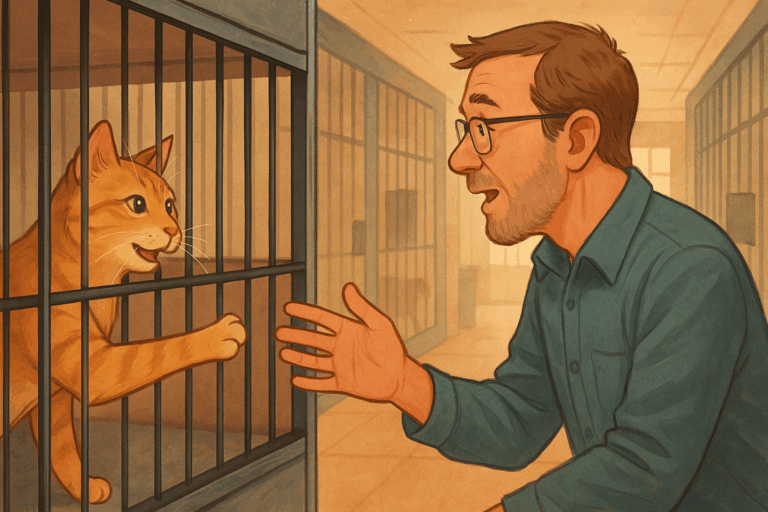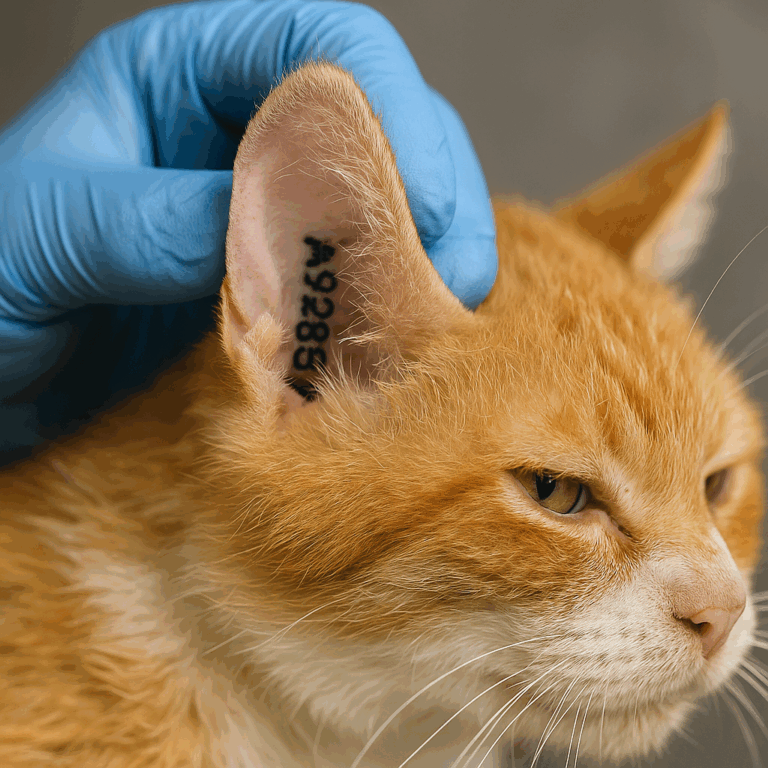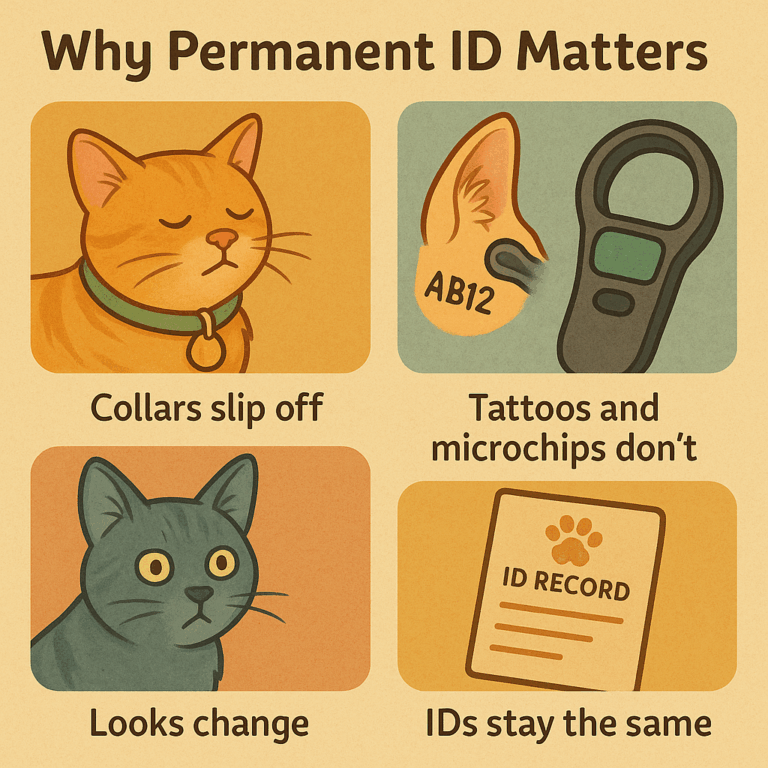Table of Contents
The Morning Everything Changed
It was just another weekday morning. Robert was heading out the door when their cat, Cuddles, saw his chance. With the agility only cats possess, he slipped out like smoke. Robert lunged, catching the collar, but it slid right off in his hand.
“Cuddles had gotten out before,” Pauline remembers. “He always came back. Always.”
But this time, he didn’t.
Days became weeks. Weeks stretched into months. The family’s hope wore thin under the heavy silence of not knowing. Was he hurt? Taken in by someone else? Still alive?
After three months, they had begun to accept the worst.
The Call That Almost Wasn’t

One afternoon, the phone rang. Pauline nearly let it go to voicemail.
It was the SPCA calling about a cat they thought might be hers, except there was a problem.
“The lady said it was female,” Pauline recalls. “She couldn’t be sure because the cat was too wild to approach.”
Cuddles was male. How could this possibly be him?
Most people would have hung up and closed the chapter. But something, hope, instinct, maybe desperation, nudged Pauline to pause.
“I asked Robert to stop by on his way home. Just to check.”
That small decision changed everything.
The Recognition That Stunned Everyone
At the shelter, staff warned Robert: the cat was defensive, feral, impossible to handle.
Then he called out: “Cuddles?”
The transformation was instant.
The animal who had been impossible to approach rushed forward, crying, rubbing against the cage, desperate to be near him.
“Even the people who worked at the SPCA knew it was his cat,” Pauline says. “It was like a switch flipped. He knew his dad’s voice.”
After months on the streets, Cuddles was almost unrecognizable. His fur was matted, his body thin, his spirit wary. But the bond between him and Robert was undeniable.
And thanks to a tiny tattoo, there was proof.
The Hidden Hero: A Tiny Tattoo

Here is what many don’t realize: after weeks or months missing, pets often don’t look like themselves. Injuries, weight loss, fear, or defensive behavior can mask their personality and even confuse trained shelter staff.
Cuddles was so transformed that staff listed him as female.
But years earlier, during his neuter surgery, Robert and Pauline had chosen to tattoo him. That little mark, permanent and registered, linked him back to them. Without it, Cuddles might never have come home.
Why Permanent ID Matters

Cuddles’ story highlights a truth every pet guardian should know: collars and appearances can fail. Permanent ID doesn’t.
- Collars slip off. Tattoos and microchips don’t.
- Looks change. IDs stay the same.
- Scared pets act differently. Chips can be scanned without touching them.
- Memories fade. Records remain.
It was that permanent tattoo that gave Cuddles a voice when he couldn’t speak for himself.
Be a Part of the 80% Responsible Owners
During our recent events, we scanned hundreds of pets, all with microchips implanted. Only to discover that approximately 20% of the pets’ microchips are not linked to any registries in North America. We recommend all pet owners to double check their pet’s registration and directly registering with us. All you need is the microchip number and/or tattoo code to start the online registration process. For a small, one-time fee of $45, your pet will be protected for a lifetime and you will also have contributed to the life-saving work of the BC SPCA.
The Bittersweet Ending
Cuddles’ return brought joy beyond words, but only for a while. Just months later, tragedy struck when a neighbor’s dog attacked him.
“We were heartbroken,” Pauline says softly. “But we were grateful. Without that tattoo, we never would have had those extra months with him. We would have spent our lives wondering.”
Even nearly three decades later, Pauline’s message is the same: “Every pet needs permanent ID. Every single one.”
Optional: Did you know? BC Pet Registry proudly took over the administration of the Provincial Tattoo Identification Program from the College of Veterinarians of British Columbia (CVBC). This program, with its roots stretching back to 1987, has been a cornerstone in the mission to identify and reunite lost or missing pets across Canada.
What Cuddles Teaches Us Today
Though this story took place in the 1990s, its lessons are more urgent than ever:
- Collars aren’t enough. They break, slip, or fade.
- Time changes everything except ID. Pets can look unrecognizable, but chips and tattoos remain constant.
- Shelters need your help. Without ID, even the most dedicated staff can’t reunite pets.
- Registration is everything. An unregistered chip or tattoo is like a locked door with no key.
Why Permanent ID Matters
Cuddles’ story highlights a truth every pet guardian should know: collars and appearances can fail. Permanent ID doesn’t.
- Collars slip off. Tattoos and microchips don’t.
- Looks change. IDs stay the same.
- Scared pets act differently. Chips can be scanned without touching them.
- Memories fade. Records remain.
Protecting Your Pet
Inspired by Cuddles’ story? Here’s what you can do today:
If your pet already has ID:
- Log into BC Pet Registry to make sure your contact info is current.
- Add a backup contact.
- Keep the ID number saved somewhere safe.
If your pet doesn’t have ID yet:
- Book a microchip appointment with your vet or local BC SPCA.
- Register it right away.
- Consider both tattoo and microchip for double protection.
For every pet guardian:
- Keep recent photos on your phone.
- Ensure your pet always wears a collar and tag as a first line of defense.
- Share this story. It might save another pet’s life.
The Bottom Line
Nearly 30 years later, Pauline still shares Cuddles’ story. The technology may have improved, with tiny microchips now connecting pets to global databases, but the lesson is timeless.
Permanent ID saves lives. It brings families back together. It gives pets a voice when they can’t call out for themselves.
Don’t wait for an emergency. Check your pet’s ID today, update your registration, and give them the best chance of coming home.
👉 Register Your Pet Today – $45 for lifetime protection.
FAQ
Q: How did Cuddles’ tattoo help bring him home?
Shelter staff mistook Cuddles for a female because of his condition after months outside. His tattoo provided undeniable proof of ownership and allowed Pauline and Robert to be contacted.
Q: Do tattoos still matter if my pet already has a microchip?
Yes. Tattoos are visible to anyone who finds your pet, while microchips provide a scannable backup. Together they give the strongest chance of reunion.
Q: Why isn’t a collar enough?
Cuddles’ collar slipped off the very moment he escaped. Collars can break, fall off, or be removed, but tattoos and microchips are permanent.
Q: Do microchips expire?
No. Microchips are designed to last a pet’s lifetime. They only work if they are registered with current information.
Q: What should I do right now?
Check your pet’s ID status with BC Pet Registry, update your contact details, and make sure you have a backup contact listed.
Q: Can I add more than one contact to my pet’s profile?
Yes. Add a backup contact who can answer if you miss the first call. You can manage contacts in your BC Pet Registry profile. Unlike other registries, which charges for this service, the BC Pet Registry does not ask you to upgrade to a premium registration in order to do this simple task.

